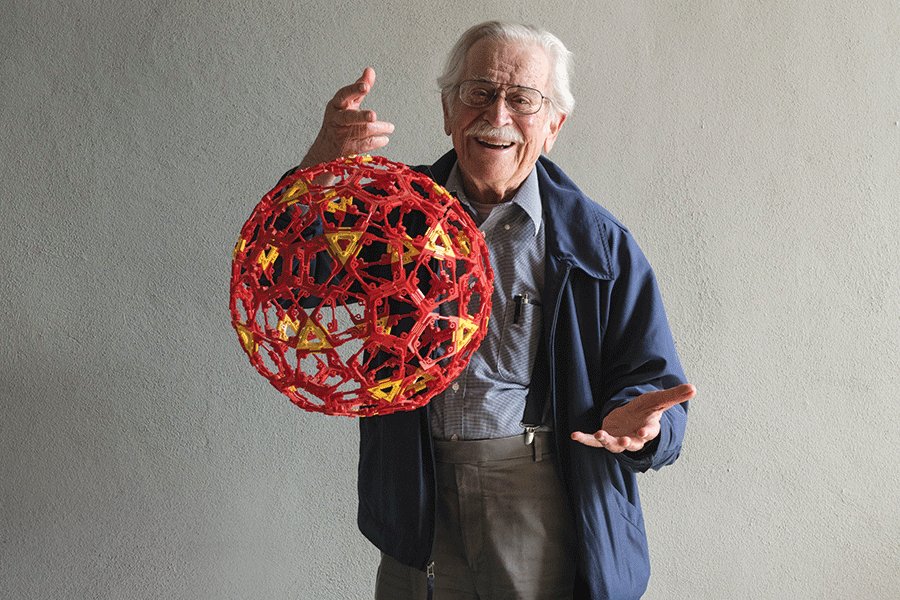Florida State University remembers renowned structural biologist Donald Caspar

Donald Caspar, professor emeritus in Florida State University’s Institute of Molecular Biophysics and a celebrated scientist who spent much of his career studying viruses, died Nov. 27. He was 94.
Caspar coined the term “structural biology,” now used by researchers worldwide to describe the field focused on identifying the molecular structures and interactions of biological molecules.
He was a pioneer in the field, including being the co-author of the Caspar-Klug quasi-equivalence theory, which revolutionized understanding on how proteins work, namely the changes of protein shape (conformation) underpinning nearly all biological functions, from response to outside signals, catalytic action or mechanical work. These conformational changes in proteins drive biology on a molecular level.
“As a scientist, Don was absolutely brilliant. He was an integral part of the research community at the time of the greatest discoveries of the last century,” said Ava Bienkiewicz, associate professor in FSU’s Department of Biomedical Sciences. “Don valued creativity and was unfazed by the pushback that often accompanies unorthodox ideas.”
After earning his bachelor’s in physics from Cornell University in 1950 and a doctorate in biophysics from Yale University in 1955, Caspar was a postdoctoral fellow at Cambridge, and collaborated with Rosalind Franklin, who helped discover the iconic double-helix structure of DNA, at Birkbeck College. He was portrayed as one of the characters in the play “Photograph 51” about Franklin’s story.
Throughout his career, Caspar held positions at Yale, Harvard, Caltech and Brandeis University, among several others before joining the FSU biology department and the Institute of Molecular Biophysics, or IMB, in 1994. The year he arrived at FSU, Caspar received a Guggenheim Fellowship and was elected as a member of the Biophysics and Computational Biology section of the prestigious National Academy of Sciences.
Caspar’s impact on Florida State was both transformational and immediate, said Peter Fajer, professor in the FSU Department of Biological Science and past director of IMB.
“Don’s arrival at FSU put us instantly on the map. The Structural Biology program in the institute was in its infancy,” Fajer said. “Don’s presence was a key factor in the institute obtaining a National Science Foundation Research Training grant, which provided us with fellowships for graduate students and postdoctoral associates.”
Over time, Caspar’s effort and vision for the program attracted and retained other top researchers and made the institute a powerhouse in electron microscopy.
His influence also extended across multiple scientific fields, said Tim Logan, associate dean in the College of Arts and Sciences and a professor in the Department of Chemistry and Biochemistry.
“He was essentially a physicist interested in biology and he spanned most of that space. His broad interests led him to seek out people in a variety of areas to see what he could learn from them,” Logan said.
Caspar also had artistic talent, clearly demonstrated in the superb drawings of virus structures that complemented his scientific writing, Bienkiewicz said.
As large as his scientific achievements were, his humanity was even bigger, Fajer said.
“At the 2017 Caspar Structural Biology Symposium, which attracted 15 members of National Academy of Sciences, four Fellows of Royal Society and two Nobel Prize winners — all coming on their own dime to Tallahassee to honor him — the common thread was ‘Don was an inspiration and mentor for me,’” he said.
For many, Caspar was a father figure who leaves a legacy marked by his deep caring for others. He was also an ardent supporter of women in science even during a time when, regrettably, many were not, Bienkiewicz said.
Caspar technically retired from FSU nearly 20 years ago, but continued coming into his office, attending seminars, and encouraging faculty and students well into his 10th decade of life, Logan said.
“Don was truly remarkable — not only an accomplished scientist, but also a kind, generous, and compassionate mentor and friend, who impacted the career journeys and lives of many,” Bienkiewicz said.
